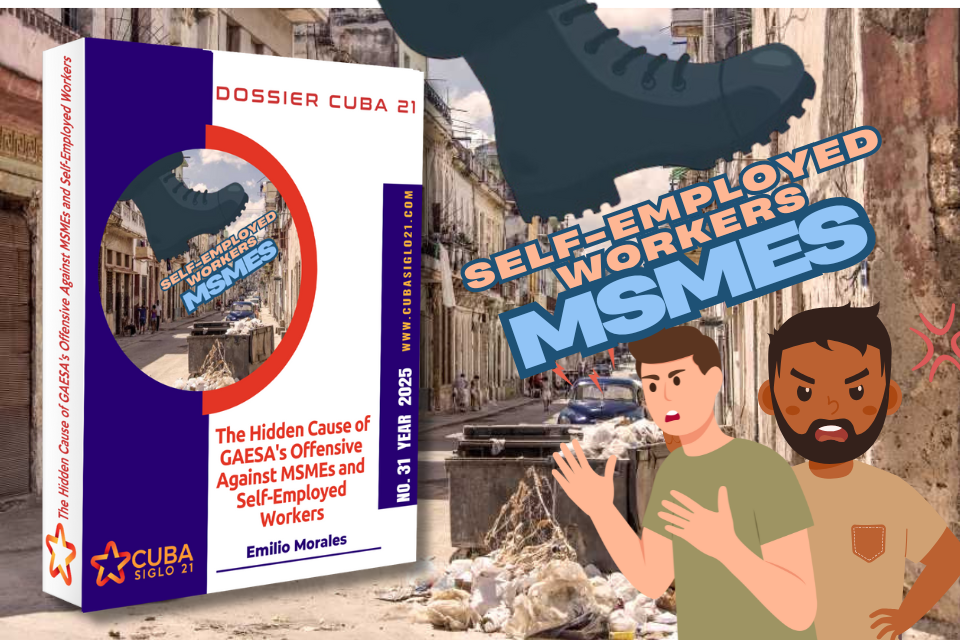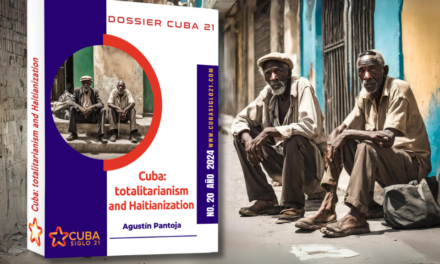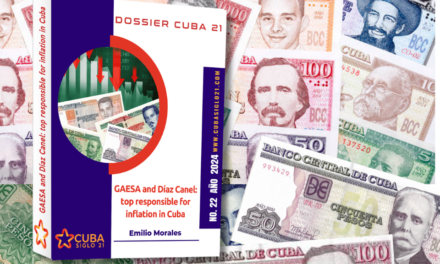Descargar reporte completo en pdf
Download Complete Report English
The year 2019, prior to the pandemic, remittances reached their highest numbers in their entire history by computing $ 3,716.71 million dollars.
In 2024, remittances barely reached$ 1,113.45 million dollars, below the $ 1,972.56 million dollars reached in 2023[i]. In summary, in 2024 remittances were reduced to 43.43% of the previous year.
Figure 1. Historical series of remittances to Cuba, 2010-2024
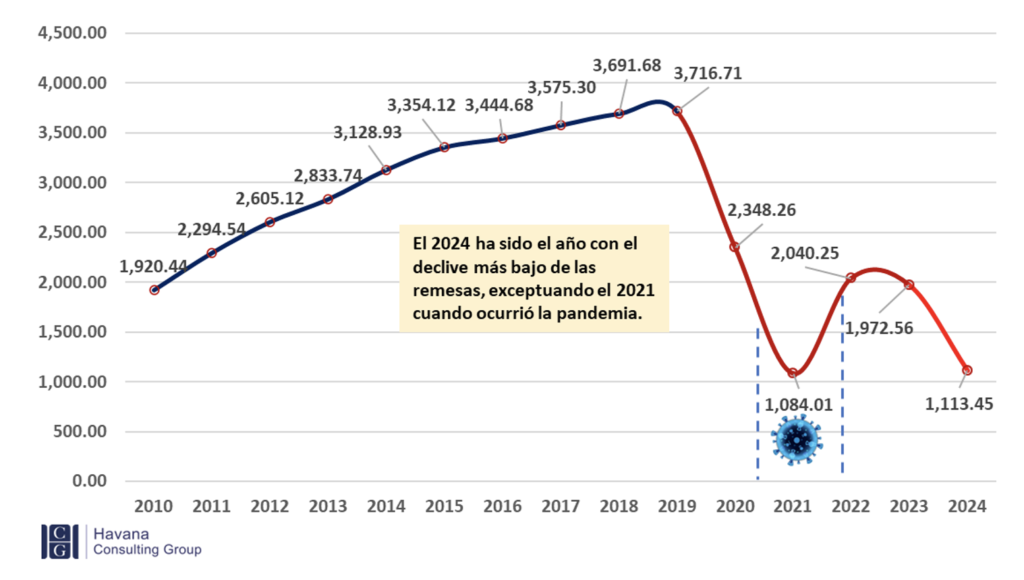
This huge decline has had a strong impact on the country’s economy, since remittances are the main support for more than one third of the Cuban population and their circulation in retail markets in turn feeds the MSMEs and self-employed workers (TCP) income of the Cuban population.
Partial dollarization of the economy
Remittances constitute the main component of the financial circuit that sustains the dollarized retail market, in which GAESA chain stores, and MSMEs and self-employed workers (TCP) participate. In addition, it is the currency that sustains the informal market and its exchange market[ii] , which is the one that prevails and dictates the dynamics of trade in the Cuban market.
This drastic reduction in remittances has led to a considerable reduction in GAESA’s income[iii] , which was forced at a certain point to share the large retail market pie with MSMEs and MCTs.
This reality, added to the loss of control of the remittance market by GAESA -today it only directly controls 7.32% of the total that arrives to the island-, plus the lack of credits, have caused the regime to place numerous obstacles and restrictions on MSMEs. These range from price ceilings[iv] , tax hikes[v] , import regulations[vi] , limitations on wholesale trade[vii] , the prohibition of 125 economic activities to exercise in the private sector[viii] and even the creation of an entity to nationalize them, known as the National Institute of Non-State Economic Actors (INAENE)[ix]. All of this is detrimental to the growth of MSMEs and puts their very existence at risk. These measures only favor GAESA and are intended to allow its companies to regain control of the dollarized retail market and its banks to try to regain control of the foreign exchange market
These reasons explain, in a certain way, the implementation of the apparently crazy measure[x] , which the Cuban regime has called “partial dollarization of the economy”, a policy that in reality pursues the objective, solely and exclusively, of satisfying the parasitic needs of GAESA.
The partial dollarization of the economy is not a measure that will get the country out of the multi-systemic crisis in which it is mired, because that is not its purpose, but to get GAESA out of the growing financial bankruptcy it is facing. It is another element that will increase the problems even more and will hinder the task of defining a way out of this growing and unstoppable crisis.
Figure 2. Dependence of the dollarized retail market on remittances and market participants.
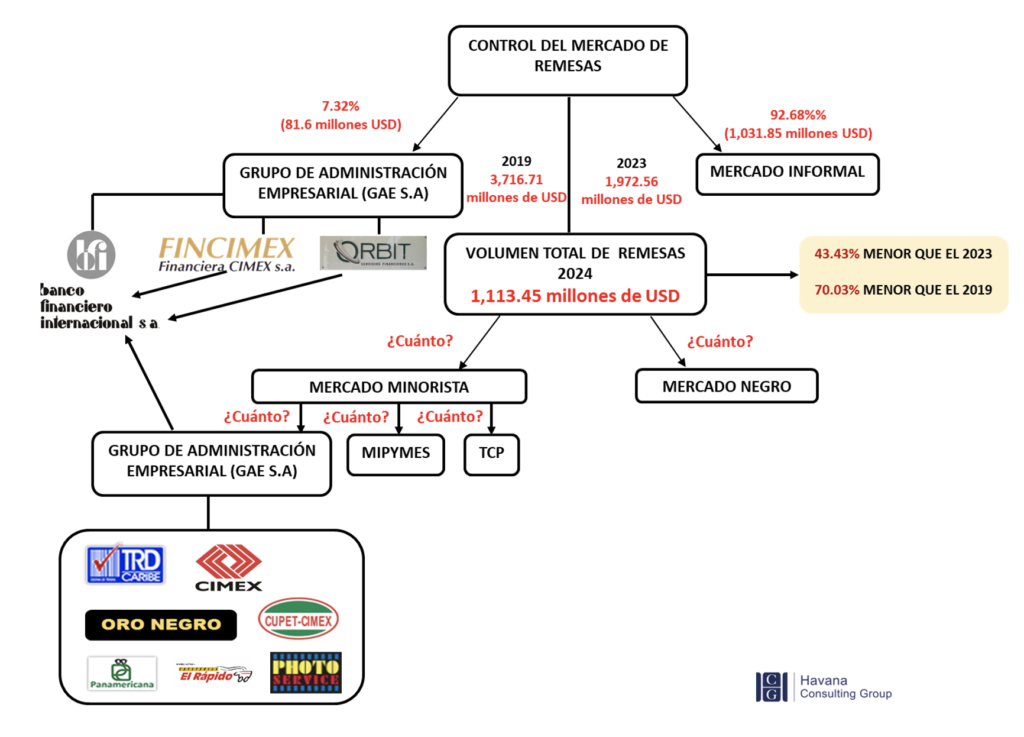
The diagram in Figure 2 reveals the real reason for the strategy of “partial dollarization of the economy”[xi] . This dollarization is based on GAESA’s loss not only of the remittance market[xii] , but also of the dollarized retail market, which it now wants to recover at all costs. Everything indicates that what is coming is a total war against the MSMEs, the self-employed workers (TCP), and in general, the informal market. This conflict may exacerbate tempers and the high level of frustration of a population that can no longer bear the burden of blackouts, lack of food, drinking water, medicines and food. This selfish and short-sighted strategy has the potential to trigger a major social outburst in the country.
Presenting the solution to the Cuban economic crisis based on the argument that it can be solved by capturing the total income from remittances is pure propaganda to legitimize a selfish, short-sighted and counterproductive move. Remittances do not depend on the will of the regime or its productive apparatus, but – exclusively – on the will of those who send them from abroad. And that will have been broken.
Sanctions against GAESA
The Cuban regime has not been successful for several years in attracting remittances, quite the contrary. No government in the world steals remittances as the Cuban oligarchy does with impunity through GAESA. In no economy in the world are remittances controlled by a military company, which also appropriates them and gives its citizens a currency with no international value that is mostly accepted by their own chain of stores. This is the reason that has led to the sanctions against these military companies that process remittances.
No country in the world imposes high fees on its citizens living abroad to process their passports, nor does it prohibit them from investing in the country; on the contrary, it creates mechanisms to stimulate the investment of its nationals. The Cuban government has scared remittances scaring away remittances and those who send them with its permanent totalitarian arrogance.
Currently, the amount of remittances arriving to the island is insignificant when compared to the enormous productive potential -today tied up- that the country has and that the government has squandered for decades so that its citizens cannot generate wealth freely. It is for this reason that the latest government program to correct distortions and to re-drive the economy is another document that will get old very soon. The implementation of the foreign exchange market and the partial dollarization of the economy will not solve the economic crisis but rather will accelerate the rise of inflation and citizen discontent.
The real solution lies in the total liberation of the productive forces, starting with agriculture and its entire productive and distribution apparatus, eliminating the state monopoly ACOPIO, freeing prices and allowing free trade in the sector based on a free market of supply and demand.
Along with this measure, it is necessary to allow the direct investment of exiles together with family members or independently, not only in MSMEs but also in large companies, as well as to allow the association between foreign and Cuban investors directly without state mediation. For this, it is essential to create a legal framework to protect and guarantee all these premises. And GAESA’s monopoly must be demolished.
Conclusions
The remittance market has suffered a strong derailment, similar to that of the sugar industry, which practically no longer exists, and very similar to what the tourism industry is suffering right now[xiii] . Its response has been dollarization, “bancarization” and an offensive against MSMEs and TCP. This confirms once again the lack of will that the oligarchy has been showing so far to replace its totalitarian regime of governance. Their immobilism clings to an unproductive system, which has lost its already small export capacity and has decapitalized the entire industrial park.
The GAESA oligarchy has despised the opportunity to turn remittances into an asset to stimulate foreign investment and develop the country. Remittances will only fulfill this important role in the framework of a democratic system, with a market economy, separation of powers and a transparent legal framework where citizens have the guarantee of being able to exercise all their rights freely.
References
[i] Morales, Emilio. “GAESA despite its monopoly loses control of remittances”. THCG BUSINESS REPORT DECEMBER 2024 No.5. THCG & TECH.
[ii] DDC. “Regime threatens to tighten circle over informal foreign exchange market: ‘it is illegal and constitutes a crime’.” Agosto 2024. https://diariodecuba.com/economia/1722526274_56360.html
[iii] Gámez, Nora. “How Cuba deceived the U.S. to obtain millions of dollars from Miami for its armed forces”. EL NUEVO HERALD. DECEMBER 2024. https://www.elnuevoherald.com/noticias/america-latina/cuba-es/article296241674.html
[iv] EFE. “Cuban government to cap prices of six basic products, sources say”. July 2024. https://www.swissinfo.ch/spa/el-gobierno-cubano-va-a-topar-los-precios-de-seis-productos-b%C3%A1sicos,-seg%C3%BAn-fuentes/82379166
[v] 14yMedio. “Con más impuestos y prohibiciones, sigue la ofensiva del régimen cubano contra las pymes privadas”. AUGUST 2024. https://www.14ymedio.com/cuba/impuestos-prohibiciones-sigue-ofensiva-regimen_1_1105471.html
[vi] 14andMeaning. “Cuban government further restricts imports for the private sector.” OCTOBER 2024. https://www.14ymedio.com/cuba/gobierno-cubano-restringe-importaciones-sector_1_1106966.html
[vii] CUBADEBATE. “Gaceta Oficial publica resolución sobre ordenamiento de la comercialización mayorista y minorista por actores económicos no estatales”. DECEMBER 2024. http://www.cubadebate.cu/noticias/2024/12/05/gaceta-oficial-publica-resolucion-sobre-ordenamiento-de-la-comercializacion-mayorista-y-minorista-por-actores-economicos-no-estatales/
[viii] MARTI NOTICIAS. “These are the new activities banned by the Government in the private sector in Cuba”. August 2024. https://www.martinoticias.com/a/estas-son-las-nuevas-actividades-prohibidas-por-el-gobierno-en-el-sector-privado-en-cuba/397722.html
[ix] CUBADEBATE. “Normative provisions regulating non-state economic actors are updated”. August 2024. http://www.cubadebate.cu/noticias/2024/08/19/se-actualizan-disposiciones-normativas-que-regulan-los-actores-economicos-no-estatales/
[x] DDC. “‘Partial dollarization is a new mistake and will not be able to lead to de-dollarization'”. ENERO 2025. https://diariodecuba.com/economia/1738269337_59687.html
CUBANET. “”Error repeated since the nineties”: experts give their opinion on the partial dollarization of the economy”. July 2024. https://www.cubanet.org/error-repetido-desde-los-noventa-expertos-opinan-de-la-dolarizacion-parcial-de-la-economia/
[xi] EFE. “Cuba recognizes that it must partially dollarize its economy for the peso to “recover””. July 2024. https://efe.com/economia/2024-07-17/cuba-crisis-divisas-dolarizar-peso/
[xii] INFOBAE. “Blow to the Cuban regime: it lost control over the remittance business, valued at 1.89 billion dollars”. December 2024. https://www.infobae.com/america/america-latina/2024/12/18/el-conglomerado-militar-que-controla-la-economia-cubana-perdio-el-95-del-dominio-sobre-las-remesas-1890-millones-de-dolares/
[xiii] Morales, Emilio. “GAESA also shuts down the tourism industry”. THCG BUSINESS REPORT DECEMBER 2024 No.5. THCG & TECH.

